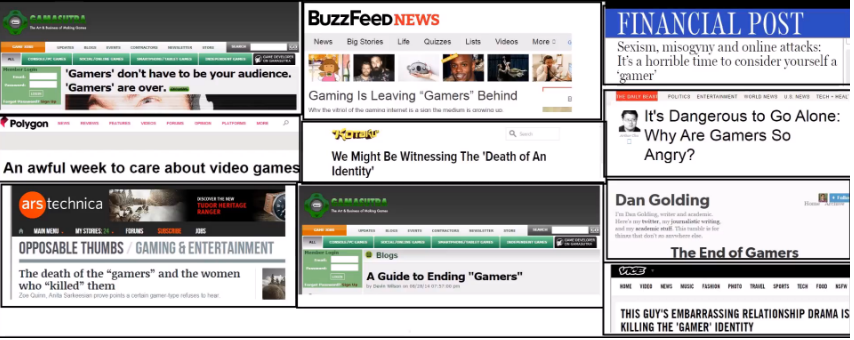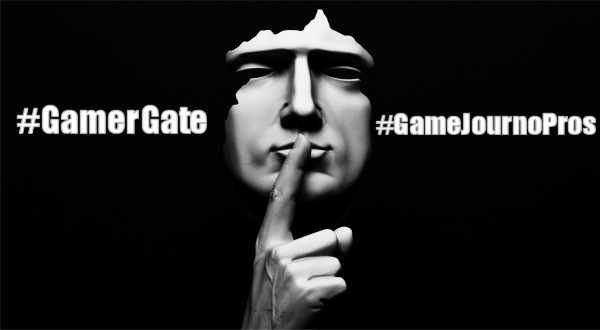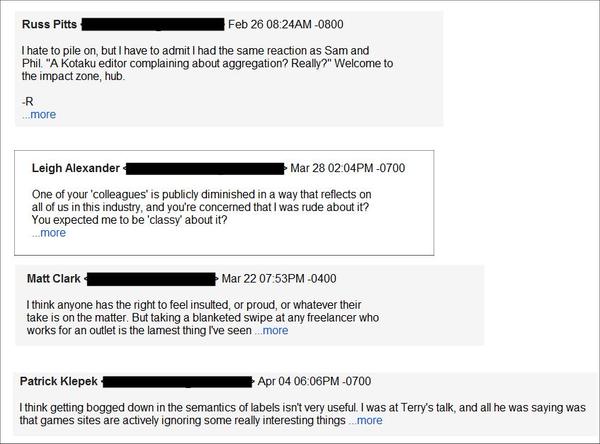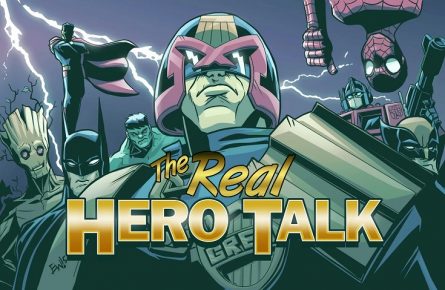Last of a Dying Breed

Are “Professional” Gaming News Sites Even Necessary, or Relevant Anymore?
Phonograph cylinders. Vinyl records. Time marched on. 8 track tapes, a spindle of magnetic, plastic stripping tucked inside. Time marched on. Cassette tapes. Smaller, able to contain more music, popular during the 1980’s. And yet not immutably so. Because even these were replaced by more modern technologies. Compact Discs. Digital Downloads. Every invention, every innovation, eventually rendered obsolete. As time wears on and people adapt to changing times and technologies, the same could be said about our intake of information from the internet.
Over a decade ago, the only real way to find information about gaming came from magazines like GameInformer, Electronic Gaming Monthly, Nintendo Power, et al. But as the internet slowly gained traction in just about every home on the planet, two out of the three listed magazines are no longer in print. Gaming sites like Kotaku, Polygon, and Ars Technica (to name a few), slowly garnered the same level of user-based consumption of information that the print magazines once had. And yet, with the proliferation of world wide web, they were simply secondary sources as more and more grassroots sites began to emulate and, in some capacity, outdo the supposed “professional” gaming sites currently out there.
So the question being asked is: exactly what do these “professional” gaming sites have to offer the growing number of gamers out there in today’s internet? What do they do that these smaller, “niche” gaming sites don’t? The answer, quite simply, is “not a hell of a lot.” So let’s try a True or False litmus test shall we?

Professional Sites Offer Fair and Unbiased Reporting: False. According to the Society of Professional Journalism, just about every major gaming site has done one of the following.
– Take responsibility for the accuracy of their work. Verify information before releasing it. Use original sources whenever possible.
– Avoid conflicts of interest, real or perceived. Disclose unavoidable conflicts.
– Refuse gifts, favors, fees, free travel and special treatment, and avoid political and other outside activities that may compromise integrity or impartiality, or may damage credibility.
– Be wary of sources offering information for favors or money; do not pay for access to news. Identify content provided by outside sources, whether paid or not.
– Deny favored treatment to advertisers, donors or any other special interests, and resist internal and external pressure to influence coverage.
– Distinguish news from advertising and shun hybrids that blur the lines between the two. Prominently label sponsored content
If we look at Kotaku alone, the fact that they failed to disclose paid and sponsored content has come back to haunt them. For the better part of the last week of November, the site was forced to disclose affiliate sales links after word got out that the FTC was updating its policies regarding undisclosed affiliate links and would take effect, and be enforced, by the early part of 2015. Also, the sad lack of a decent or even competent fact checking team has all but shredded whatever credibility the site has since the GamerGate controversy first started up.
And it’s no secret that IGN has publicly stated that they take money “equally” from both Microsoft and Sony to advertise and sponsor paid promotional fluff pieces on their site. To them, we gamers are simply clicks. And the more clicks they get to go through their advertisers, the more money they get to pocket. That’s why places like Gawker are up in arms about GamerGate going after their advertisers. We’re taking money out of their pockets. Plain and simple. So, they make GamerGate the “enemy.” They paint them in as negative a light as they can; as this vitriolic, hateful subculture that shuns inclusivity and shouts down discourse just so they can continue to gleam on to some outdated ideal.
They breathe in that hate and spew out whatever nonsense they can to make you think you still need them in some capacity. That you need politically paid-for, agenda driven narratives injected in your lives because in some way it makes them sound more important than what they are. That somehow they’re this deep thinking, intellectually superior being who knows more, is more, and will be more, than you. And that if you disagree with them in any way, then you’re colluding with the enemy and should be socially shunned and publicly outed as this inept misanthrope you always were. I hate to break it to them, but a true intellect does not have to tell the world they’re smart. The world tells the intellect that they are.
Too many of these gaming sites have pushed out unfiltered, unbiased gaming news to make more room for these ludicrous, self-important op-eds that drive and hammer that social narrative into your skull like a rusted railroad spike. The fact of the matter is, there are genuine problems, authentic concerns, about games journalism. Somewhere not long ago in the past, it stopped being about how games should be creative and artistic and free to pursue its own course in how successful or how popular, or how even how much fun it is, and instead became a study on why games all around are problematic to this industry. Fun, and Gamer, are both apparently dead now.
Gaming Journalists Think For Themselves and Do Not Collude on Any Major Points Regarding Social Narrative, Persons Within the Organization, or Persons They Report On: Holy shit, False. BrietBart pretty much blew that out of the water when Milo Yiannopoulos reported on the GameJournoPros list.
– Deny favored treatment to advertisers, donors or any other special interests, and resist internal and external pressure to influence coverage.
– Expose unethical conduct in journalism, including within their organizations.
This list has already defined the social narrative, cost people their jobs, blacklisted others, and lied about having certain people’s participation within. But according to Kyle Orland, this was all just a simple “harmless” mailing list. A place where friends could “bounce ideas” off one another. Is having a friend in a rival publication illegal or wrong? No. But when you’re asking advice from several of these “friends” on how to discipline one of your contributing writers/journalists, then it becomes collusion. When they’re all blacklisting a fellow industry employee because Kuchera says to do so, then it becomes collusion. And when you cover for someone else who says “Oh, I’ve never been on the GameJournoPros list,” and evidence proves otherwise, then it becomes collusion. It becomes a large part of the problem.
They spent years building and climbing their ivory towers, shouting down from the battlements and throwing scraps down to the masses, trying desperately to remind the world that we need them. But what they failed to realize is that while they bent their eyes to the people below, they should have instead looked forward, to the towers being built all around them. Places that do not shout down, but speak to, the gamers. Places like Niche Gamer, TechRaptor, The Escapist – who, despite being considered a pro site, has managed to conduct itself with grace, dignity, and professionalism – and Game Nosh just to name a few off the top of my head. Places that respect the communities they’ve built, the people they’ve met, the friends they’ve made. They don’t see a click. They see a person.
8 track tapes. VCR players. Dial-up internet. All eventually replaced. All within my lifetime. And as I watch places like Polygon, Kotaku, Ars Technica, Gamasutra, et al, slowly loosing momentum, slowly withdrawing back into the shadows of the world wide web, slowly strangling its own collective necks; when the day comes, and the day will come sooner than these sycophants would have you believe, or even sooner than they’d like, it will be brutal. They will wail and lash and lament at the masses one final time that “You need us!” The blackened trees all around them now a dead forest, the cracks in their ivory tower made all the more apparent as it spreads and fractures across their false facade.
And we, safely gathered in the fresh spring-colored courtyards all around them, will simply shake our heads and shout out “No. We don’t.” And though saddened by the spectacle of watching their fall, as it all crumbles and shatters and slowly returns to the aether it was made from, we remind ourselves that we did not fail them. They failed us. More importantly they failed themselves. We remind them that they willingly allowed themselves to be corrupted by the less-savory aspects of this industry. They allowed themselves to be compromised professionally and respectfully by greed. By outside influences. By agendas that had no right to insert itself the way it did in all our lives. And these “Journalists”, these “obtuse word-slingers”, these narratively broken, morally bankrupt shills, have only themselves to blame.
They’ve only themselves. To blame.
*For even more alternatives to grassroots gamer-infused news and specialty sites, feel free to offer your support and patronage to any of the sites listed HERE.*











OK I think I have it fixed. Anyway, I also removed an image I was, at first, OK with. But I looked at it, and I knew it was disingenuous to the fact that there HAS been some upswing to a few of these sites. Minus Gamasutra.
I take responsibility for that, personally. If I am to speak of the opposition, then I shouldn’t adopt the same cherry-picking tactics that I decry.
Because then, I only become the monster I swore to defeat.
I was about to comment on your graphic. Good that you saw and addressed the problem with it.
Of course, and if you see anything of mine, past or present, that you disagree with, or suspect of less than honest intent, call me out on it. I can take it. Shit I can take pretty much any insult thrown at me.
Boot camp will do that to you 😀
and here folks, in the wild, we see the rare and elusive, ethical journalist. here he is , a near extinct breed, fixing an article to make it more factual. truly, they are one of a kind creatures. but seriously, thanks for being ethical, dude
Hey, Marcus.
Thanks for the mention. We really do appreciate all the visitors we get over at Niche Gamer. Personally, the best part of clicking through the site for me is seeing all the comments below the articles. I’ve always loved discussing all forms of media and culture. When a news item or review or editorial gets people talking in the comments is when I feel really good about what I’m doing there.
I don’t get these sites that actively despise their own readership, or “hardcore” gamers, or “dudebros”, or whatever. I’d be happy to see all kinds over at our site. It keeps things interesting, right?
I could carry on about the meatier stuff you mention above, but I won’t attack your comment section. Thanks again for the shout-out.
Agreed. We love seeing the comments and discussing multiple topics on our forums. It boggles my mind that a business can get away with dumping on their customers, but that’s essentially what these AAA sites do.
We’re just trying to create content that we want to see in our little corner of the internet. And it’s good to see that Niche Gamer is, too.
Nice article Marcus!
@Dimi
It’s cool. And I know I missed shouting out to a lot of other places that have taken what some may consider a “huge risk” for taking a side in this debate. And to those sites, I do apologize, but know that though I do not speak for everyone here, I support the bold and courageous people who have.
For a long time, this site was pretty much neutral on the whole issue of GamerGate. I’ll be honest now and say though, that I was leaning heavily on the proGG side… and then a certain BLOCKLIST hit. There we were, along with a few of our community members, being actively pinned as being part of a “hate group.”
That decided it for me right there.
I often wondered why games journalism is the way it is in this day and age. And then, a few weeks ago, as I was on my way home from work, it seemed to click with me.
There I was in a little convenience store, passing by the magazine rack. I glanced at it on my way to grab a soda.
I stopped dead in my tracks.
There, beside Time, The New Yorker, a few local prints, there were “yellow” mags everywhere. Closer, National Enquirer, pop culture trash-loids. All eye-level, all begging to be read with these overprinted titles like “PREGNANT!”, “DRUNK!”, “SEX TAPE!”
My mouth went dry. My stomach knotted a little.
This is what people, probably the younger generations, are taking in now. To them, THIS is journalism. This is what they feed on, feed off, and talk about.
And it’s infected video games. But luckily, GamerGate is their reality check. A smart, stinging slap to the hand. And they don’t like it. So they’ll vilify us. They’ll hate us. They’ll make us out to be the monsters we never were.
Because in reality, we’ve been trying to kill that monster. For years now.
And though it’s been a slow process, we will.
To add on to that point, I, for one, never actually went jumped into Gamergate. However, I’m avidly pro-consumer and believe games journalism is so broken as to not even exist. I find that most Gamergaters consider that good enough, which says a lot of the GG movement and not very much about those that seem to be outright anti-gamer.